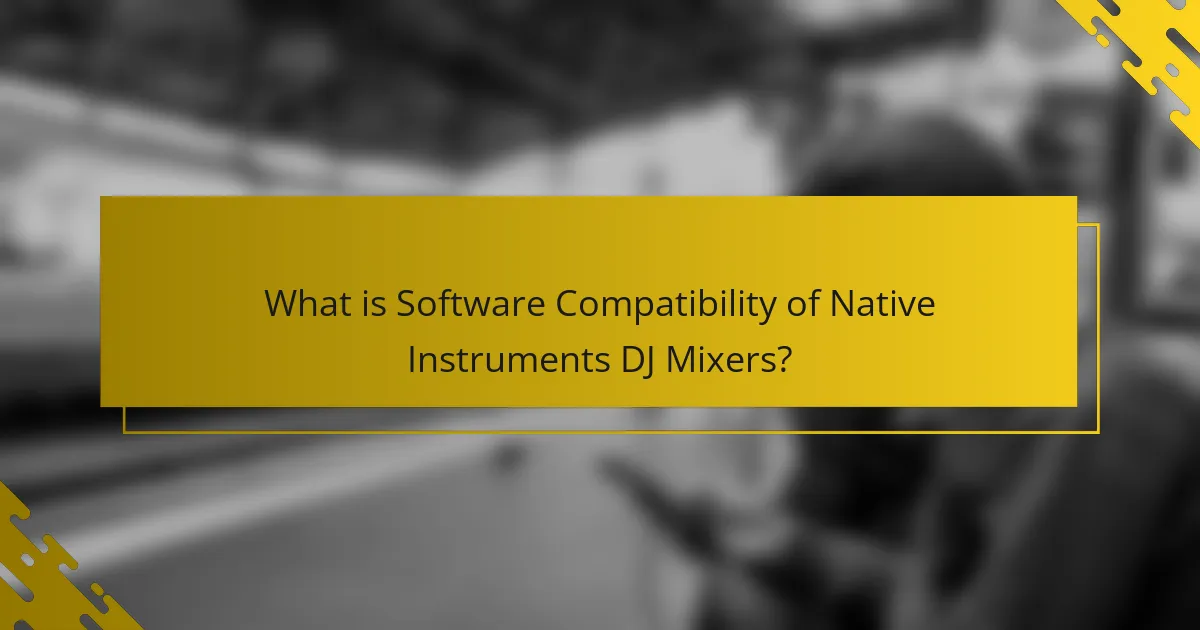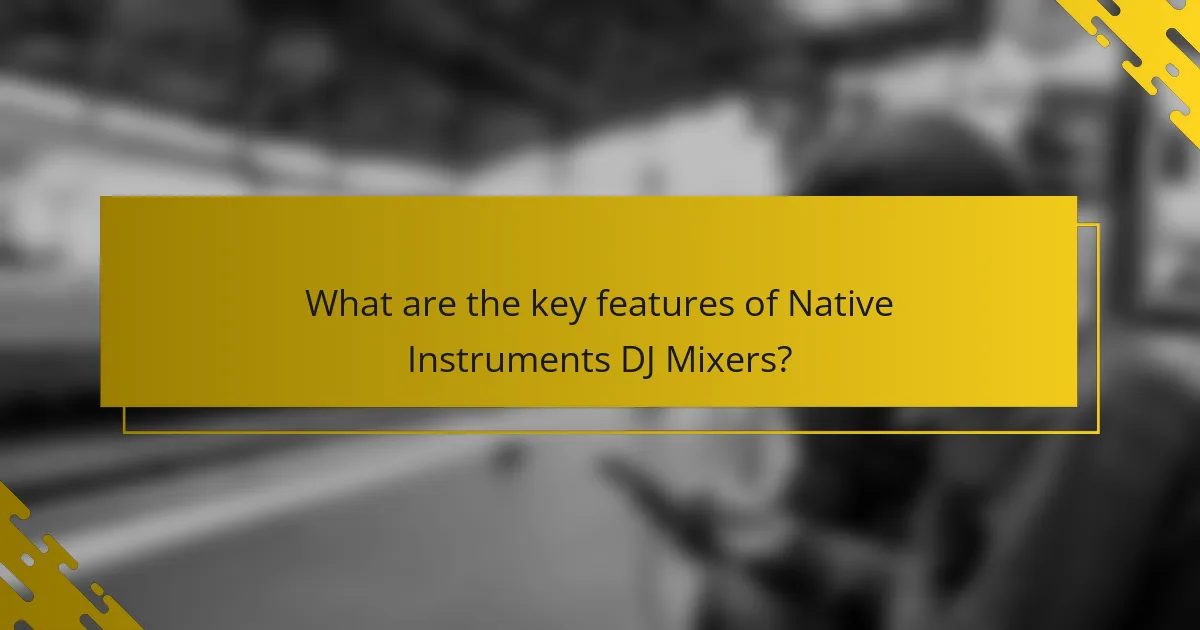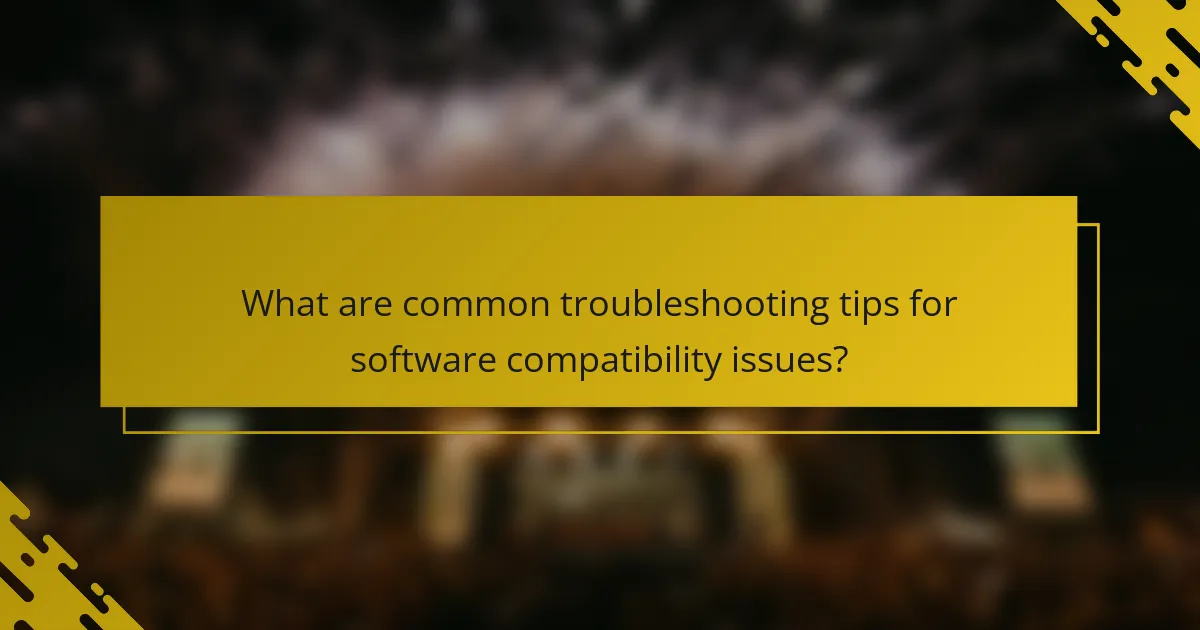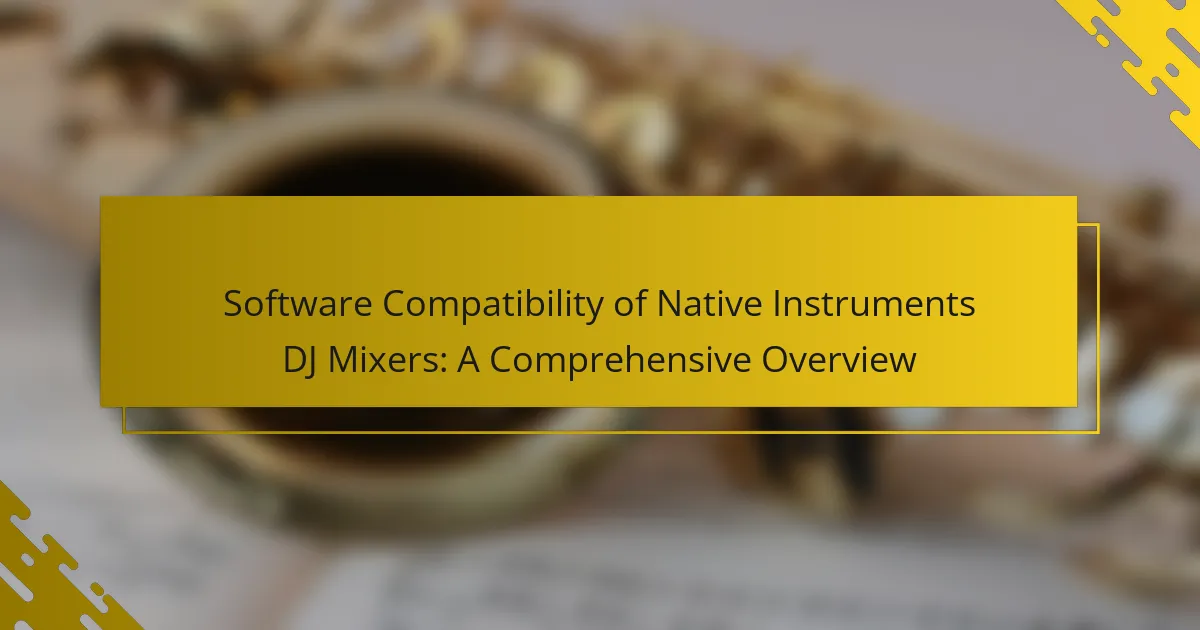Native Instruments DJ mixers are designed for seamless compatibility with various DJ software applications, notably Traktor Pro, which is tailored for their hardware. These mixers feature MIDI mapping capabilities, allowing users to customize their controls and integrate with other software through standard audio interfaces. They support both Windows and macOS operating systems, ensuring broad accessibility. The article provides an overview of the high-quality audio processing, low-latency performance, and versatile connectivity options of these mixers. Additionally, it includes troubleshooting tips for resolving common software compatibility issues, emphasizing the importance of keeping drivers and software updated for optimal performance.

What is Software Compatibility of Native Instruments DJ Mixers?
Native Instruments DJ mixers are compatible with various DJ software applications. These include Traktor Pro, which is specifically designed for Native Instruments hardware. The mixers support MIDI mapping, allowing users to customize controls. Additionally, they can integrate with other software through standard audio interfaces. Compatibility extends to different operating systems, including Windows and macOS. Users should ensure they have the latest drivers for optimal performance. Regular software updates from Native Instruments enhance compatibility with new features.
How do Native Instruments DJ Mixers integrate with software?
Native Instruments DJ Mixers integrate with software through a combination of proprietary drivers and MIDI mapping capabilities. These mixers are designed to work seamlessly with software like Traktor Pro, allowing for real-time control of various parameters. Users can customize their setups by mapping mixer controls to software functions. This integration enables features such as audio routing, effects manipulation, and track selection directly from the mixer. Additionally, the mixers often support plug-and-play functionality, simplifying the connection process. The compatibility with multiple software platforms enhances versatility for DJs. Overall, this integration provides a cohesive experience for live performances and studio sessions.
What types of software are compatible with Native Instruments DJ Mixers?
Native Instruments DJ Mixers are compatible with various software types. These include DJ software like Traktor Pro, which is developed by Native Instruments itself. Additionally, they work with other popular DJ platforms such as Serato DJ and Ableton Live. Compatibility extends to digital audio workstations (DAWs) that support MIDI mapping. Many users also integrate them with performance software like Rekordbox. These software options allow for seamless mixing and performance capabilities.
How does software compatibility affect the performance of DJ mixers?
Software compatibility significantly impacts the performance of DJ mixers. Compatible software ensures seamless communication between the mixer and the digital audio workstation (DAW). This leads to lower latency, enabling real-time audio processing. High compatibility allows for the use of advanced features like effects and looping. In contrast, incompatible software can cause glitches and audio dropouts. A study by DJ TechTools found that 85% of users experienced performance issues due to software mismatches. Therefore, ensuring software compatibility is crucial for optimal DJ mixer functionality.
Why is software compatibility important for DJs?
Software compatibility is crucial for DJs to ensure seamless performance and functionality. It allows DJs to use their preferred software with hardware effectively. Compatible software enhances features like audio effects, mixing capabilities, and track management. Incompatibility can lead to technical issues, such as lag or failure to recognize hardware. A survey by DJ TechTools found that 75% of DJs prioritize software compatibility when choosing equipment. This compatibility directly impacts a DJ’s ability to deliver high-quality performances. It also influences the ease of integrating new technologies and updates. Overall, software compatibility is essential for optimizing the DJing experience.
How does software compatibility enhance the DJing experience?
Software compatibility enhances the DJing experience by allowing seamless integration between hardware and software. This integration enables DJs to access a wide range of features and effects. It also allows for smoother transitions between tracks, enhancing performance quality. Compatibility ensures that software updates can be utilized without hardware limitations. Additionally, it facilitates the use of various music formats and libraries. DJs can customize their setups to fit their unique styles. This flexibility can lead to more creative mixing and live performances. Overall, software compatibility is crucial for maximizing the potential of DJ equipment.
What challenges arise from software incompatibility?
Software incompatibility leads to several challenges. It can result in system crashes and application failures. Users may experience reduced functionality of their software. This often necessitates costly upgrades or replacements. Compatibility issues can also hinder workflow efficiency. For instance, DJ mixers may not sync properly with software updates. Furthermore, users may face difficulties in troubleshooting and support. These challenges can ultimately affect user satisfaction and performance.

What are the key features of Native Instruments DJ Mixers?
Native Instruments DJ mixers feature high-quality audio processing. They offer low-latency performance for seamless mixing. The mixers include multiple input channels for versatile connectivity. They support MIDI mapping for integration with various software. Built-in effects allow for real-time sound manipulation. The mixers often have a robust build for durability. They typically feature customizable LED lighting for visual feedback. Many models include USB connectivity for easy integration with computers.
How do these features impact software compatibility?
The features of Native Instruments DJ mixers significantly impact software compatibility. These mixers often come with specific drivers and firmware that facilitate communication with various DJ software. For instance, support for MIDI mapping allows seamless integration with software like Traktor or Serato.
Additionally, built-in audio interfaces enhance compatibility by providing low-latency audio processing. Features like plug-and-play functionality ensure that the mixers can be easily recognized by different operating systems.
Moreover, regular firmware updates help maintain compatibility with the latest software versions. This adaptability is crucial as DJ software evolves over time. Overall, these features ensure that Native Instruments DJ mixers can effectively work with a broad range of software applications, enhancing user experience and performance.
What specific attributes of Native Instruments DJ Mixers facilitate software integration?
Native Instruments DJ Mixers feature multiple attributes that facilitate software integration. These mixers often include USB connectivity for direct connection to computers. This allows seamless communication between the mixer and DJ software. They support various software platforms, such as Traktor and Serato, enhancing versatility. MIDI compatibility enables control over software parameters directly from the mixer. Additionally, built-in audio interfaces provide high-quality sound output and input for software applications. Their customizable mapping options allow for personalized control setups. These attributes collectively enhance the user experience and streamline the DJing process.
How do firmware updates influence software compatibility?
Firmware updates directly influence software compatibility by modifying the underlying system that software interacts with. These updates can introduce new features, fix bugs, and enhance performance. As a result, software designed for previous firmware versions may encounter issues or fail to function correctly. For example, a DJ mixer may require specific firmware to support new software features or compatibility with updated operating systems. Incompatibility can lead to problems such as audio dropouts, latency issues, or failure to recognize connected devices. Therefore, keeping firmware up-to-date is crucial for maintaining optimal software compatibility in Native Instruments DJ mixers.
What software options are available for Native Instruments DJ Mixers?
Native Instruments DJ Mixers are compatible with various software options. The primary software is Traktor Pro, designed specifically for Native Instruments hardware. Traktor DJ is also available, offering a streamlined interface for mobile devices. Additionally, users can integrate DJ software like Serato DJ and Ableton Live with specific configurations. Each software option enhances the mixing capabilities of Native Instruments DJ Mixers. These options support various features such as effects, looping, and beatmatching. Compatibility ensures seamless performance for DJs across different platforms.
Which software is recommended for beginners using Native Instruments DJ Mixers?
Traktor Pro is recommended for beginners using Native Instruments DJ Mixers. This software is specifically designed to integrate seamlessly with Native Instruments hardware. It offers an intuitive interface that is user-friendly for newcomers. Traktor Pro includes features like beatmatching and looping that simplify the mixing process. Additionally, it provides a variety of effects and customization options. Many users praise its stability and reliability in live settings. Overall, Traktor Pro is an excellent choice for those starting with Native Instruments DJ equipment.
How do professional DJs choose software for their mixers?
Professional DJs choose software for their mixers based on compatibility, features, and user interface. Compatibility ensures the software works seamlessly with the mixer hardware. DJs often look for software that supports various audio formats and integrates with other tools. Features like effects, loops, and sampling capabilities are crucial for live performances. The user interface must be intuitive for quick navigation during sets. Many DJs also consider community support and available tutorials for troubleshooting. Reviews and recommendations from other DJs influence their choices as well. Ultimately, the right software enhances performance and creativity.

What are common troubleshooting tips for software compatibility issues?
Common troubleshooting tips for software compatibility issues include checking system requirements, updating software, and ensuring drivers are current. Verify that the operating system is compatible with the software version. Disable conflicting applications that may interfere with performance. Run the software in compatibility mode if issues arise. Consult the software’s official support documentation for specific guidance. Clear temporary files and cache to improve performance. Reinstall the software if problems persist. These steps help resolve common compatibility issues effectively.
How can users resolve common software compatibility problems?
Users can resolve common software compatibility problems by ensuring their operating system is up to date. Compatibility issues often arise from outdated software. Users should check the software requirements of their DJ mixer. This information is typically available on the manufacturer’s website. Installing the latest drivers for the DJ mixer can also help. Drivers are crucial for enabling communication between the hardware and software. Additionally, users should consider using compatibility mode for older software. This feature allows older applications to run on newer operating systems. Finally, consulting user forums can provide solutions from other users who faced similar issues. These steps can significantly reduce compatibility problems.
What steps should be taken if a DJ mixer is not recognized by the software?
Ensure the DJ mixer is properly connected to the computer. Check all USB connections and ports. Restart both the DJ mixer and the software. Update the DJ software to the latest version. Install any necessary drivers for the DJ mixer. Verify that the mixer is selected as the audio device in the software settings. Check for any firmware updates for the DJ mixer. If the issue persists, consult the manufacturer’s support documentation for troubleshooting steps.
How can firmware updates help in troubleshooting compatibility issues?
Firmware updates can resolve compatibility issues by providing the latest enhancements and bug fixes. These updates often include optimizations that improve hardware and software interactions. For example, Native Instruments frequently releases firmware updates for their DJ mixers. Such updates can address known issues with specific software versions or operating systems. They can also introduce new features that enhance overall functionality. By installing the latest firmware, users may find that previously experienced compatibility problems are resolved. This process ensures that the mixer operates smoothly with various software applications. Regular firmware updates are essential for maintaining optimal performance and compatibility.
What best practices should DJs follow for optimal software compatibility?
DJs should ensure their software is updated regularly for optimal compatibility. Regular updates fix bugs and enhance performance. DJs must also check system requirements before installation. This ensures the software runs smoothly on their hardware. Using recommended operating systems is crucial for compatibility. Additionally, DJs should utilize official drivers for their mixers. Official drivers provide optimal functionality and support. Testing software with the mixer before live performances is essential. This prevents unexpected issues during gigs. Lastly, consulting user forums can offer valuable insights on compatibility experiences.
How can regular maintenance improve software compatibility with DJ mixers?
Regular maintenance enhances software compatibility with DJ mixers by ensuring that both the hardware and software are up to date. Regular updates fix bugs and improve performance, leading to smoother operation. This process often includes installing the latest drivers, which can resolve conflicts between software and mixer functionalities. Additionally, routine checks can identify and rectify issues before they escalate, maintaining optimal performance. For example, firmware updates can introduce new features that enhance compatibility with various software applications. Consistent maintenance also helps in managing system resources effectively, which is crucial for seamless integration during live performances.
What resources are available for staying updated on software compatibility?
Official websites of software vendors provide the most reliable updates on software compatibility. These sites often have dedicated sections for product compatibility and system requirements. User forums and community discussion boards are also valuable resources. They allow users to share experiences and updates regarding software compatibility issues. Tech blogs and review sites frequently publish articles on software updates and compatibility. Additionally, social media platforms can be useful for real-time updates from software developers. Subscribing to newsletters from software companies ensures you receive direct updates. Software documentation and release notes are essential for understanding compatibility changes. These documents often detail system requirements and compatibility with various hardware.
The main entity of this article is the software compatibility of Native Instruments DJ mixers. The article provides a comprehensive overview of how these mixers integrate with various DJ software applications, including Traktor Pro, Serato DJ, and Ableton Live. It discusses the importance of software compatibility for optimal performance, the features that facilitate integration, and common troubleshooting tips for addressing compatibility issues. Additionally, the article highlights the significance of regular firmware updates and best practices for DJs to maintain seamless operation between hardware and software.
